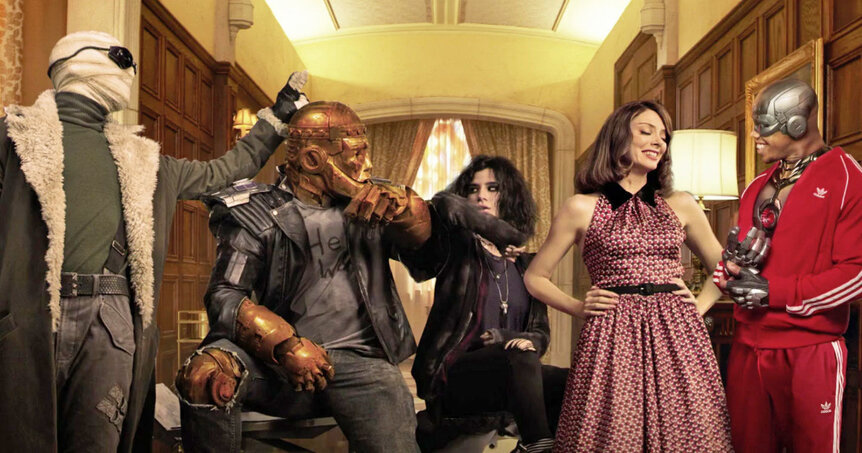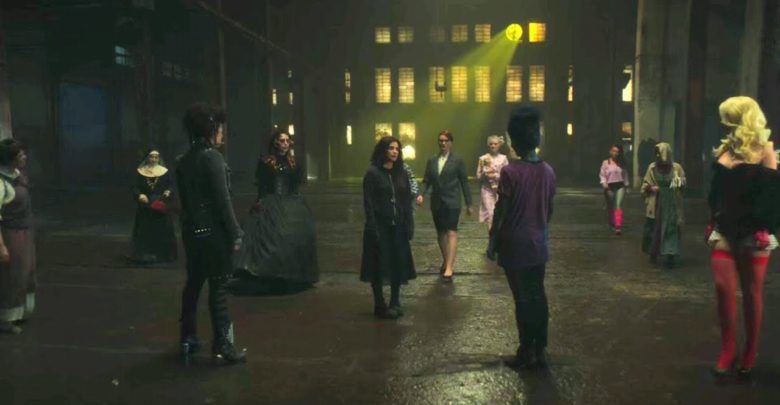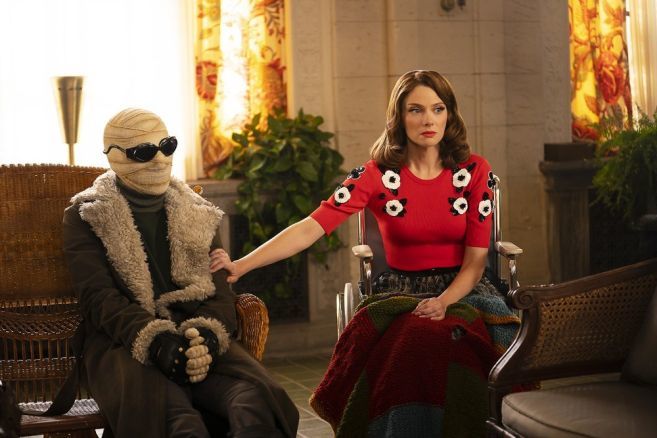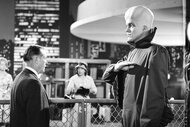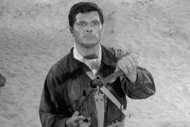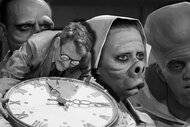Create a free profile to get unlimited access to exclusive videos, sweepstakes, and more!
Radical forgiveness in the Doom Patrol
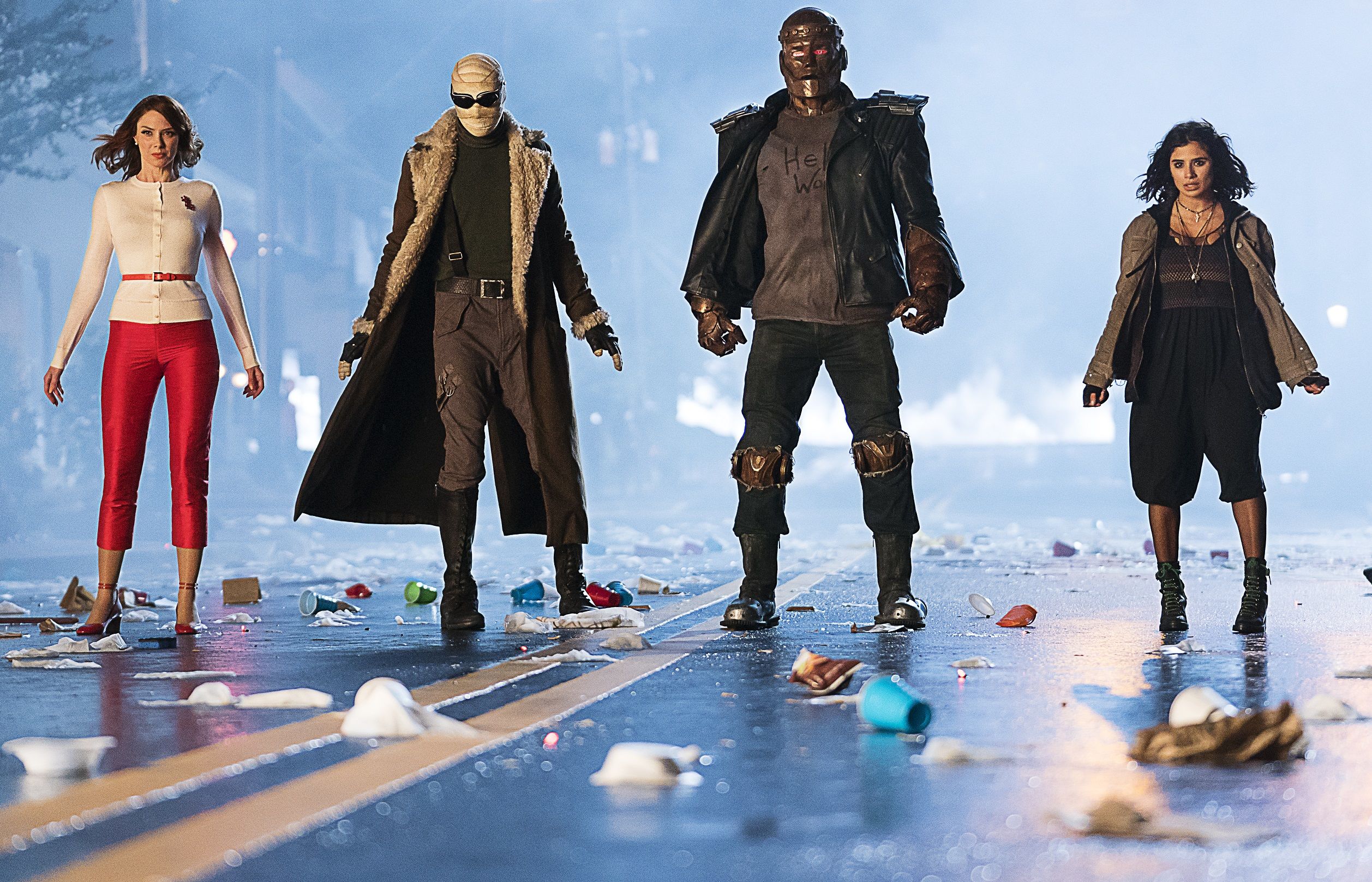
The DC Universe series Doom Patrol opens with the mysterious Niles Caulder delicately placing the brain of race car driver Cliff Steele into the robotic body that would become its new home. A bewildered Steele is forced to come to terms with his new reality, letting go of old expectations and relearning things like how to successfully ascend a staircase under his own power. Behind the curtain, the villainous Mister Nobody conspires to pull the rug underneath the group of outcasts Cliff now finds himself a part of, better known as the Doom Patrol.
Shedding old skin to become something better, accepting and forgiving ourselves for the way trauma changes us, and the way our great struggles might even come to define us (and change us for the better) are the messages at the heart of Doom Patrol’s first season. Through an active, challenging, and painful growth process, each member of the team becomes a better person. Though their insecurities take on literal and monstrous proportions, it is the radical act of letting go of ancient anger and biases to embrace something new that brings about their greatest triumphs.
Spoiler warning for Doom Patrol's first season below.
Self-Care PatrolThe Doom Patrol in this iteration is made up of the aforementioned Cliff Steele, alongside former Hollywood actor Rita Farr, Justice League hopeful Cyborg, former military personnel Larry Trainor, and professional punk Crazy Jane as they attempt to track down their mentor Niles, who has been kidnapped for reasons unknown by Mister Nobody. During this process, this ramshackle group of utter weirdos reveal their insecurities and pain, first debilitated by them and later redeemed through them.
The need for healing comes under the microscope early on in the episode "Therapy Patrol," in which most of the story is about each character individually struggling to leave their room due to personal depression and malaise just to make it to a group meeting. The villain of the first half of the episode is not a spandex-clad megalomaniac, but rather the mere struggle of getting out of bed and pulling oneself together enough to engage with other humans. Jane says one flippantly cruel thing to Rita and she literally falls apart, liquefying and sliding down a vent into a furnace. Only through an extreme exercise of willpower does Rita even make it to the table. Cliff launches into a plea for communication and sharing among the team. Letting down their guards long enough to be vulnerable with each other proves to be a greater challenge than any of the bad guys they encounter.
Cliff and Jane
In life, Cliff was a negligent father and husband, and he never got his chance to atone to the women in his life. For Cliff, his redemption is found through truly being there for Jane in a way he could not have been for his daughter. In the episode "Jane Patrol," Jane must go deep within herself to confront the demon that terrorizes her. Cliff finds himself drawn into the Underground, where Jane’s 64 different personalities attempt to co-exist when not in control of their shared physical form. When he is told that no man can enter the deep recesses of Jane’s mind, Cliff declares, “I’m not a man! I used to be a man. I’m a better person now.” Despite all danger, he follows Jane into her own personal Hell, where she confronts her personal demons.
Jane’s father was sexually abusive, and it caused Jane to divide a line between her young self, who she felt to be innocent, and her adult self, who she could not forgive. By coming face to face with her younger self and acknowledging that she was just a kid who never deserved to be treated that way by someone who was supposed to protect her, Jane starts the process of forgiveness. While she struggles with the concept, perhaps more than the rest of the team, the fact that she is still trying beneath her defensiveness and anger makes for one of the best episodes of the series.Cyborg and Toxic Parents
Writers have often struggled with the characterization of Vic Stone, someone who has come under much criticism for being so physically representative of the treatment of black men in superhero comics. In Doom Patrol, Vic’s relationship with his parents is finally fleshed out and explored. His relationship with his body, as well as his fear of being exploited, are directly dealt with when he signs up for an online dating app and finds himself the subject of fetishizing behaviors.
Victor’s father seems to view him as his personal property and a monetary investment on an equal footing with being his son and a human deserving of his own autonomy. When he comes to Doom Manor to reclaim Vic, both Rita and Jane have Vic’s back, verbally chastising him for the harm he’s done his child. Vic might not forgive his father in the end, but it’s not for lack of trying. His father crossed a moral horizon with Victor, and some relationships aren’t worth saving.
This take on Cyborg shows us a young man under unbelievable stress to succeed while being likewise pressured to pretend not to acknowledge the social prejudices that directly affect him. On top of that, he bears the terrible guilt of believing himself to be the person who killed his mother. His father manipulated and used him to advance his own career and reputation. Like the other members of the Doom Patrol, who Victor initially felt superior to, he is also the plaything of forces greater than himself. His story is about taking control and letting go of toxic relationships, no matter how impossible it seems to survive without them.
Negative Man’s story in Doom Patrol evolved to become possibly one of television's most poignant commentaries on a man’s self-loathing relationship with his own homosexuality. Larry Trainor was originally a star pilot who took incredible risks in part because he was tormented by his own sexuality. He carried on a secret affair with a genuinely caring man while lying to his wife and kids and attempting to maintain the facade of heteronormativity.
The Negative Spirit that inhabits Trainor’s body is initially at odds with him. It forces him to revisit his painful memories of how he ruined things with the love of his life because he couldn’t stop caring what other people thought of him. When he visits Danny, a sentient, traveling street on which outsiders make their home, the open queerness and community he finds there make him uncomfortable. He steps up to defend them and himself in the end, making a statement by punching a man who had tortured him right in the face, spitting out, “Tell them Captain Trainor sent you!”
Negative Man heals by merging with the Negative Spirit rather than rejecting it. For him, the key to happiness is to finally stop resisting and allow himself to find a family and a cause he is willing to put his life on the line for. His friendship with Rita and her own power of determination helps him find himself, and in the end, he’s finally dropped his self-image as an impossible loner and embraced his place in a greater community of outsiders, a struggle that will be profoundly resonant with a lot of queer viewers.
Rita Farr’s Hero ArcWhile the other members of the Doom Patrol tend to hide their struggles behind a wall of aggression, Rita’s vulnerability is constantly on display. She’s the one with the least material control over her physical form. When she doubts herself, everyone can see it, as she melts into an amorphous state. Throughout the season, she is wracked with self-loathing and a certainty of her own powerlessness. A terrible secret she has kept for too long is eventually revealed: Rita had contributed to the sexual exploitation of young Hollywood starlets and then turned her back when one of them needed her help. That young woman died through self-inflicted wounds. Later, Rita confesses that she genuinely felt that the accident that caused her to become unable to maintain her physical form was nothing more than what she deserved. “Looking away should be so much harder than it is,” she wept.
Early in the season, Rita is tormented by the awful things she did as a Hollywood star. Her powers are uncontrollable and debilitating. She is mortified at the suggestion that she could somehow be a heroic figure. Things begin to change for Rita as she begins to show heroism in the face of conflict. When a young man named Elliot is to be killed due to the fact that he is the central cause of a pending apocalypse, Rita still puts herself in danger to keep him from harm. Her complicated moment of heroism causes others to become angry with her, as Elliot’s death would have solved all their problems, but Rita’s morality and her kindness are what’s important.
Later, Rita confesses her worst sins, and she takes charge of her life. She’s the person who pushes them all to go after the Chief, to save him. When Mister Nobody attempts to narrate her actions, she cuts him off and begins to tell her own story. She returns even after Niles has been proven instrumental in their shared personal disasters. When reality is fraying under a depressed Mister Nobody’s watch, Rita sits down with him in a bar for a drink. Though they are enemies, Rita gives it to him straight and encourages him to take control of his life. Rita’s triumph is beyond cathartic — and it is because of, not in spite of, her raw emotional vulnerability.
The Finale
The last episode of the first season showed all the characters empowered and achieving a greater sense of themselves through their struggles. Cliff demanded that he deserved better, crawling his way out of the esophagus of a giant rat named Admiral Whiskers and insisting that he didn’t deserve to be treated this way by life. Jane chose to return to and stand by her friends. Larry and Rita eventually took control of their stories and embraced the use of their powers for good. The Chief actually told the truth, despite what it cost him. Even Mister Nobody reclaimed his sense of self after a deep depression.
Everyone in the Doom Patrol struggles to forgive someone, and more often than not, that person is themselves. Learning to interact with one another in a more genuine and deeply felt way is easily as big a struggle for this team as any of the many supervillains they face. The person they believe saved them is actually the person who caused their worst suffering, and yet they all actively choose to see past that to the good things he has done in his life. By showing us all the traumas these characters couldn’t forgive themselves for and forcing them to deal with them head-on through the lens of a bonkers superhero narrative, Doom Patrol’s first season is particularly meaningful for survivors and outcasts everywhere.
The views and opinions expressed in this article are the author's, and do not necessarily reflect those of SYFY WIRE, SYFY, or NBC Universal.
